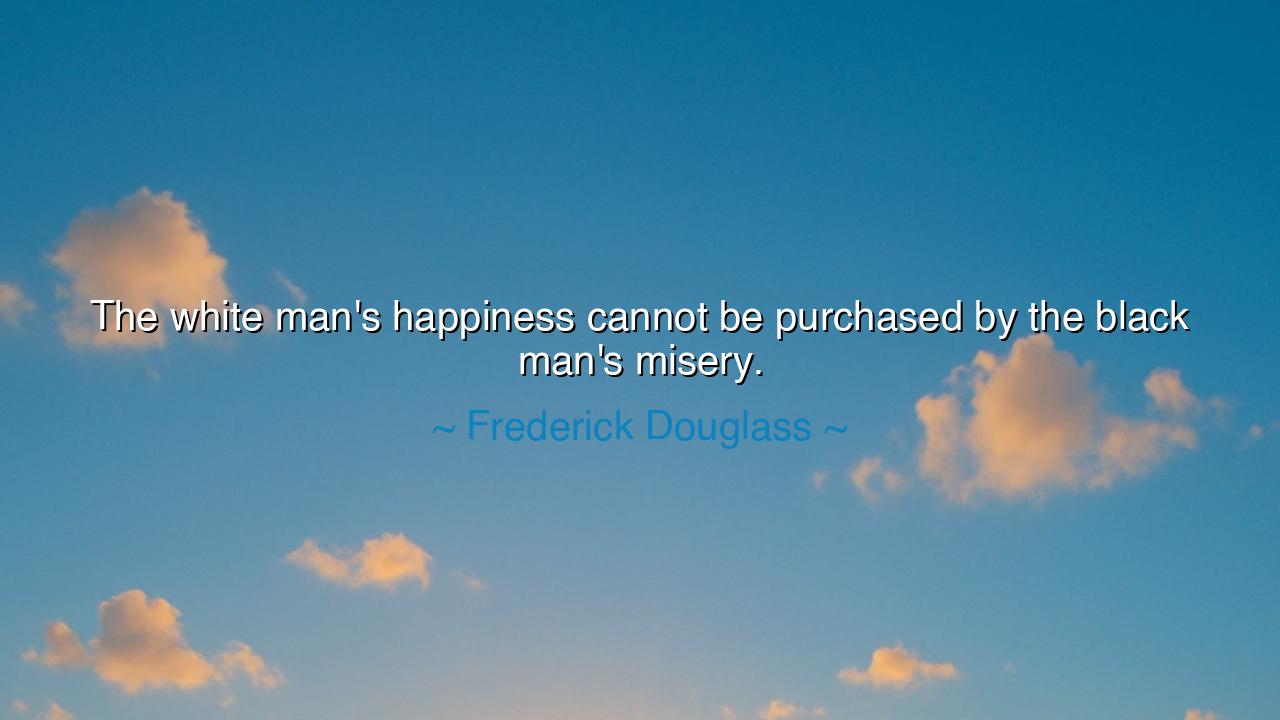
The white man's happiness cannot be purchased by the black man's






“The white man’s happiness cannot be purchased by the black man’s misery.” Thus declared Frederick Douglass, the prophet of liberty, the voice once chained yet never silenced. In this mighty sentence lies the cry of a soul that had tasted both bondage and freedom — a truth carved in the furnace of suffering and lit by the fire of moral awakening. Douglass spoke not only to his own time but to all ages: that no man’s joy can be built upon another man’s pain, and that the foundation of true happiness must be justice, not domination. His words are both lament and warning, a moral law as eternal as the sunrise — that oppression poisons not only the oppressed, but the oppressor as well.
When Douglass uttered these words, the land of his birth — America — was torn between two moral worlds. The white masters of the South had built their comfort on the backs of enslaved Africans. Their fields yielded wealth, but that wealth was stained with tears. Their churches preached salvation, yet their hands were shackled in sin. The “happiness” they claimed was a hollow illusion, born from misery, sustained by the degradation of others. Douglass, having himself escaped from slavery, knew the falsehood at the heart of such comfort. For he had seen that injustice may enrich the body, but it enslaves the soul.
To the enslavers, he declared that freedom could not be divided by color, nor peace built upon cruelty. “You may enslave a man’s body,” his life proclaimed, “but you enslave your own conscience in doing so.” The slaveholder, in his arrogance, imagines himself free; yet he is bound by fear, haunted by the trembling of those he wrongs, poisoned by the moral corruption of his own deeds. The happiness of the wicked is but a shadow that flees before the dawn. Douglass revealed that true peace, true prosperity, true civilization — can never be purchased with the coin of human suffering.
Consider the tale of Emperor Ashoka of India. Once a conqueror who bathed his empire in blood, he stood amid the ruins of war and saw not triumph, but desolation. His victory was hollow — his heart, heavy. Then he turned from conquest to compassion, renouncing violence and embracing the path of righteousness. Ashoka learned, as Douglass taught centuries later, that one man’s happiness built upon another’s pain is a lie, a fleeting mirage that dissolves beneath the gaze of truth. His empire flourished thereafter, not through the sword, but through mercy and justice.
So too, Douglass envisioned an America redeemed — not a nation of masters and slaves, but of brothers and sisters, each sharing equally in the divine light of liberty. He believed that the measure of a civilization is not the comfort of its powerful, but the dignity of its weakest. He warned that no people can remain free while they hold others in chains; for oppression, like a plague, spreads inward, corrupting the hearts of those who wield it. His life itself became a testimony to this truth — rising from the pit of slavery to the summit of moral greatness, proving that freedom, once ignited in the human spirit, can never be extinguished.
The deeper wisdom of Douglass’s words is this: happiness that requires the suffering of another is not happiness, but delusion. The pleasures of exploitation, of greed, of superiority, are as fleeting as smoke. Only that which is shared can endure; only justice can sustain joy. In this way, his teaching transcends race and era. It speaks to all who build comfort upon the labor of others, who profit from inequality, who close their eyes to the suffering that upholds their privilege. He calls each of us to awaken — to see that the world’s peace depends on our compassion, and that one man’s dignity is bound to the dignity of all.
So, dear listener, let this truth dwell in your heart: your joy is not real if it comes from another’s pain. Do not seek comfort that costs another his freedom. Do not rest easy while others labor in despair. For what we do to one, we do to all — and what we deny another, we lose in ourselves. Seek happiness, not in dominance, but in justice; not in conquest, but in compassion. Live in such a way that your peace brings peace to others, your prosperity uplifts, and your freedom liberates.
For as Frederick Douglass taught, and the ages confirm, no man can stand in sunlight while his brother remains in chains. The happiness that endures — the happiness worthy of the human spirit — is born not from misery, but from mercy. When justice reigns, and every man stands free, then, and only then, shall the human family know what true happiness is.






AAdministratorAdministrator
Welcome, honored guests. Please leave a comment, we will respond soon